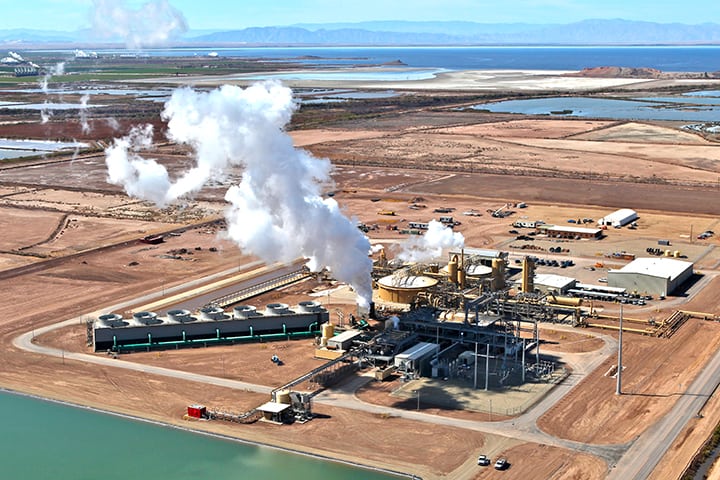DOE Awards $46 Million for Geothermal Projects
A federal government geothermal program based at the University of Utah has chosen 17 projects that will receive up to $46 million from the U.S. Dept. of Energy (DOE). The DOE on Feb. 24 said its Frontier Observatory for Research in Geothermal Energy (FORGE) Initiative will support funding for what it called “cutting-edge, domestic, and carbon-free geothermal projects with potential to supply power to homes in the United States.”
“There is enormous untapped potential for enhanced geothermal systems (EGS) to provide clean and reliable electricity to power tens of millions of homes across the country,” said Kathleen Hogan, the acting undersecretary for Science and Energy at the DOE. “These investments in EGS research support President Biden’s mission to take on the climate crisis by pushing the frontiers of science and engineering and creating jobs in cutting-edge clean energy fields.”
Tuesday’s announcement comes on the heels of a virtual seminar organized by Baseload Capital, a Swedish investment firm focused on geothermal, held last week. During that event, Kristina Hagström Ilievska, chief marketing officer for Baseload, called geothermal “the sleeping giant” when it comes to power generation. She noted that geothermal today accounts for less than 2% of total global energy consumption, while noting that, “unlike solar and wind, it can stay on around the clock,” and its “heat can be found everywhere on the planet.”

The program in Utah includes research and development of what are known as Enhanced Geothermal Systems (EGS), which are different from conventional geothermal resources that occur naturally in the U.S. and worldwide. Those conventional resources are geographically limited due to the need for underground heat and fluids, according to the DOE, while “EGS are manmade geothermal reservoirs and can be engineered in most parts of the country, potentially expanding geothermal energy production and transforming the domestic energy portfolio.”
Program Began in 2015
The FORGE Initiative began with the selection of five projects in 2015. The FORGE site, near Milford, Utah, was announced in 2018. The Utah facility includes a laboratory where scientists and researchers learn how to engineer manmade EGS systems; the DOE said it is the first dedicated field site of its kind.
The agency said the projects that receive funding “will gain a fundamental understanding of the key mechanisms controlling EGS success; develop, test and improve new techniques in an ideal EGS environment; and rapidly disseminate technical data and communicate lessons learned and best practices to the public.”
Mitt Romney, a Republican senator from Utah, in a statement said, “Energy-rich Beaver County continues to be a flagship area for renewable energy production, as it is home to the commercial scale of solar, wind, hydro, and geothermal production. This funding will support the continued partnership between the University of Utah and the Department of Energy to expand geothermal energy and make progress toward commercializing new innovative sources of energy for our state and the country.”

“Enhanced Geothermal Systems are exciting technologies that will enable the expansion and scalability of geothermal energy across the nation,” said Dr. Will Pettitt, executive director of Geothermal Rising, the industry’s professional and trade association. “With today’s announcement, the FORGE project will provide research, development, and demonstration of these technologies, breathing welcome support into the industry by the Department of Energy and steering a successful future for a clean and renewable energy source that helps secure the nation’s energy needs, decarbonize our society, and fight climate change. The project also provides countless technology crossover benefits for shovel-ready geothermal projects that will directly create quality jobs and welcome relief for the economy.”
Project List
The following projects were selected by Utah FORGE, in collaboration with the DOE’s Geothermal Technologies Office, to move forward with negotiating awards. The 17 projects are divided among five topic areas:
Topic 1: Devices suitable for sectional (zonal) isolation along both cased and open-hole wellbores under geothermal conditions.
- Welltec / Katy, Texas
- PetroQuip Energy Services, LLC / Waller, Texas
- Colorado School of Mines / Golden, Colorado
Topic 2: Estimation of stress parameters.
- Battelle Memorial Institute / Columbus, Ohio
- Lawrence Livermore National Laboratory / Livermore, California
- The University of Oklahoma / Norman, Oklahoma
Topic 3: Field-scale characterization of reservoir stimulation and evolution over time, including thermal, hydrological mechanical, and chemical (THMC) effects.
- Clemson University / Clemson, South Carolina
- Stanford University / Stanford, California
- Lawrence Berkeley National Laboratory / Berkeley, California
- Rice University / Houston, Texas
Topic 4: Stimulation and configuration of the well(s) at Utah FORGE.
- Fervo Energy / Houston, Texas
- The University of Texas at Austin / Austin, Texas
Topic 5: Integrated laboratory and modeling studies of the interactions among THMC processes.
- Pennsylvania State University / State College, Pennsylvania
- Lawrence Livermore National Laboratory / Livermore, California
- U.S. Geological Survey / Denver, Colorado
- The University of Oklahoma / Norman, Oklahoma
- Purdue University / West Lafayette, Indiana
Pennsylvania Democratic Sen. Bob Casey in a statement said, “This grant will further the development of renewable, clean energy. Penn State continues to be at the forefront of research into 21st century challenges. I applaud the students and researchers at Penn State for their work to receive this grant.”
Frank Lucas, a Republican representative from Oklahoma and ranking member of the House Science, Space and Technology Committee, in a statement said, “America leads the world in installed geothermal capacity, but it accounts for just two percent of our renewable energy portfolio. Developing advanced geothermal energy technology requires strong investment in basic and early-stage research, like the awards announced today.”
Lucas continued: “Our country has significant hydrothermal and geothermal energy resources, and if harnessed correctly, these resources have the capability to provide secure baseload power and energy storage for Americans across the country, which is why I introduced the Advanced Geothermal Research and Development Act and advocated for its inclusion in the Energy Act of 2020. As has been witnessed in the great state of Oklahoma, by investing in early-stage research in enhanced geothermal systems, we can dramatically improve our ability to access and use clean and constant geothermal energy. We know that American industry and our research enterprises have the necessary resources to successfully diversify America’s energy resources, and the FORGE initiative funds announced today ensure we continue our journey further developing clean energy technologies.”
—Darrell Proctor is associate editor for POWER (@POWERmagazine).